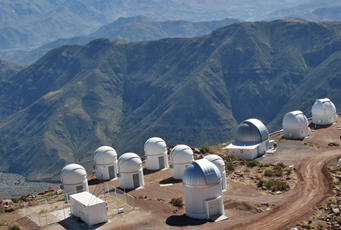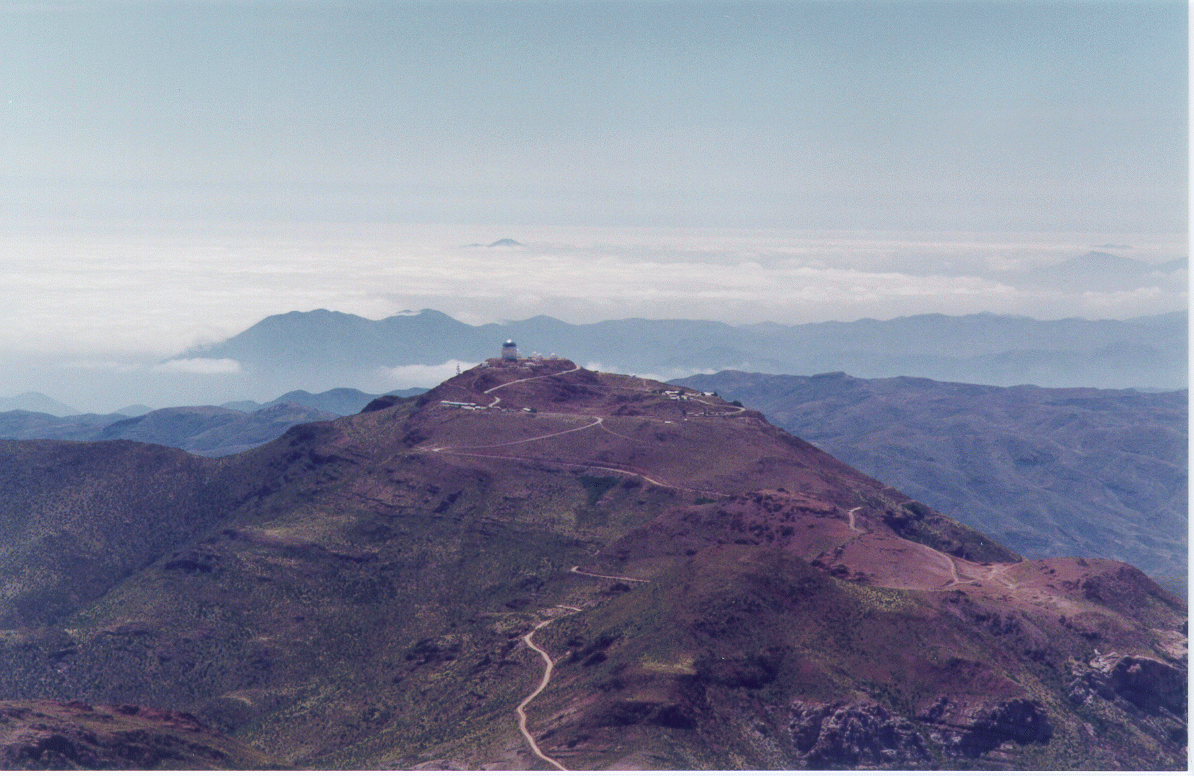Latin America
Related: About this forumChile telescope array spots nearby Earth-sized planet
Chile telescope array spots nearby Earth-sized planet
by Andrew Grant 1:00pm, November 11, 2015

[font size=1]
SHADOW HUNTING Eight 40-centimeter telescopes staring at the sky above Cerro Tololo in Chile discovered the nearest Earth-sized exoplanet.
Jonathan Irwin
[/font]
The nearest Earth-sized planet beyond the solar system is at most 39 light-years away.
That’s the distance to GJ 1132b, a newly discovered rocky planet about 1.2 times as large as Earth that orbits a small, dim star in the constellation Vela. The planet is almost certainly too hot to support life, but it is about 90 light-years nearer to us than the next-closest known Earth-sized planets. The discovery could herald the era of probing the atmospheres of nearby small worlds for signs of life. GJ 1132b is “arguably the most important planet ever found outside the solar system,” Drake Deming, an astronomer at the University of Maryland in College Park, writes in a review that accompanies the study in the Nov. 12 Nature.
The MEarth-South Observatory, an array of eight automated, 40-centimeter telescopes in Chile, spotted the shadow of GJ 1132b as it crossed in front of its star once every 1.6 days. The researchers claim that the Hubble Space Telescope could determine the composition of GJ 1132b’s atmosphere by measuring the starlight that passes through it.
https://www.sciencenews.org/blog/science-ticker/chile-telescope-array-spots-nearby-earth-sized-planet
[center]
Cerro Tololo, Chile



 [/center]
[/center]
Science:
http://www.democraticunderground.com/122843457
Peace Patriot
(24,010 posts)...and where there are uninhabitable planets, there are likely smaller, more habitable planets nearby--as we have found in our own solar system, with the uninhabitable giants Jupiter, Saturn and Neptune, and the much smaller, habitable Earth, and possibly habitable Mars (at least in the past), and the smaller but not habitable Venus. The SYSTEM produced life, with Jupiter likely a key factor in the habitability of Earth (pushed asteroids carrying water--and maybe even microbes--into the inner solar system).
Astronomers have also found, only recently, that several of Jupiter's and Saturn's moons--and also Pluto--have huge oceans with geothermal activity, underneath the icy surfaces, making life very likely there. So we have subsystems, within our solar system, that also likely have produced life, partly based on the proximity of the giant (but uninhabitable) planets (which probably supply the friction that creates geothermal activity on their moons). (I say probably because Pluto, just in the last few months, has been proven to be similar to the moons of Jupiter and Saturn--large ocean with geothermal activity--but without a giant planet around. What is causing Pluto's geothermal activity? I don't think anybody knows yet--NASA was open-mouthed with surprise.)
Anyway, articles like this (about the Earth-like, but too hot, planet only 39 light years away) should mention whether or not astronomers are able to check (or have checked) for accompanying planets and moons in the system. If they are unable to check for smaller planets or moons, they should say so. (And if they are certain that there are not, they should say so.) I think they're finding that one-planet systems are rare, so the presumption should probably be that there are other planets/moons in this system, until proven otherwise. Just because the most obvious and most detectable planet is too close to its sun to harbor life (as we know it), doesn't mean that there is no life in the system.
Only 39 light years away! Well, that's not exactly close (except for a lightbeam message, and it would be about 80 years total for a reply to be received, if there is anybody out there, and if they reply right away). (I'm no physicist. Can we send lightbeam messages?) But it's a good candidate for SETI and other observations, and for a long distance robot observer/messenger such as Viking 1 & 2. There is a project in the early planning stages for sending such a robot/messenger to the Alpha Centauri 3-star system (only 4.24 light years away--closest to our sun). Wiki says, with current propulsion systems, it could take "several millennia," but suggests that new propulsion systems in the not too distant future could make it in a matter of decades.
It's an interesting article, on Alpha Centauri:
https://en.wikipedia.org/wiki/Alpha_Centauri
The Alpha Centauri system currently has only one candidate planet. It very likely has other planets but they are too small to see. Congress (2010) cut the funding for the program that could detect smaller planets. (Jeez! Congress is so-o-o-o-o !@#$-ed up!!! Billions and billions for the banksters, billions and billions for the goddamned "war on drugs," billions and billions for killing and planning to kill other people, billions and billions in tax breaks for corporations, and they can't find the piddling little amounts that NASA spends trying to find us another planet, needed because the banksters and the military and the corporations are killing this one, while extracting billions and billions and billions of dollars from us in subsidies?!)
forest444
(5,902 posts)
Judi Lynn
(160,524 posts)Diplomacy takes too long, and you can't hold a gun to anyone's head. War is the answer, killing as many of them as it takes to neutralize the survivors, paralyze them with fear.
No reason to invest the money from the taxpayers in education, a future for the masses, funnel it all into projects which benefit the wealthy people only. Same with health care, water, shelter, everything else.
The bad consequences from their abuse of the earth, as well as its people won't become lethal, they hope, until well past the time they have all died very old, in their sleep in their lavish homes, surrounded by loved ones desperate to be included in the will.
No money for deep, HUGE answers about the greater meaning, the vast life possibility when you can literally grab and GO (smugly in your costly bed in your lavish room in your ridiculous house).
Luckily the right-wing pigs can't control everyone yet, and the rest of the world still struggles to learn, and to reach toward a better life, a bigger view of life.
There can't be any small minds among the real scientists. That's impossible.
Peace Patriot
(24,010 posts)...of Teller in "Dr. Strangelove"? (--the nuclear apocalypse has been triggered and all the nuclear scientist, Dr. Strangelove, can think of, is how many nubile young women each man can have in their special bomb shelter for the elite.)
Teller wanted to USE the Bomb--for power, for domination--and he also plagued this country and others with nuclear waste, from nuclear energy, that never goes away--a type of energy that threatens every region where nuclear generators are installed with unconscionable horrors, as Japan and Russia have learned, and, indeed, with threats to all life on earth, even if the Bomb is never dropped again.
Teller lied and lied and lied about all this!
A big mind for evil, I suppose, but a small mind for the things that are important in human life and for life itself.
I'd also have to dispute the point as to scientists who have prostituted themselves in any number of fields (biological warfare, GMO agriculture, genetic engineering, poisonous corporate food and medicines, weapons design, psychiatrists who participated in torture, the 'scientists' who lie about global warming, scientists who torture animals, and other examples of the use of science for huge greed and great harm).
Of the various scientific fields, I'd say that the LEAST likely to be involved in corporate/military greed and harm are astronomers--maybe because their minds HAVE to be large and open to do what they do, and maybe also because there isn't much money in that field. Astronomers are more likely to be "pure scientists" (to do what they do for the joy of advancing human knowledge, and for the awesomeness and beauty of their subject). Too many other scientists have sullied the name of science because of who they work for, and what they do for who they work for. Probably most of them would like to do "pure science" but get sucked into corporate life and corporate power-mongering inadvertently. Some are like Teller, though--power mad, or money mad. They have small, closed minds on ethical and humanitarian issues, and take no responsibility for the human and environmental consequences of what they do.
I just noticed that you qualified your statement: "There can't be any small minds among the real scientists.
With that I would agree. Teller and others like him are not real scientists--they are exploiters of science. They exploit their own intelligence; then they exploit the rest of us--with breathtaking stupidity.
"...loved ones desperate to be included in the will." LOL!
Judi Lynn
(160,524 posts)before my eyes. His face always seemed creepy, well before I learned what his real talents were.
[center]
 [/center]
[/center]
What a shame it was to have that much capacity, then use it for the deaths of helpless people. Exactly what kids' movies call "evil scientists." I can't imagine how people keep from going insane living with the aftermath of this kind of destruction. It's hard to believe he could have been proud of himself.
[center]  [/center]
[/center]